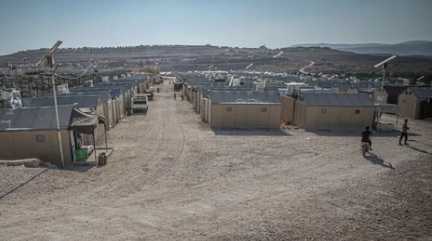
14 April 2022; MEMO: The displacement camps in the north-western Syrian province of Idlib are suffering from the worsening economic and food crises this Ramadan, with residents barely able to purchase basic essentials due to a mixture of high prices and food shortages.
According to the Turkish newspaper Anadolu Agency, Syrians who are displaced from a decade of war live in camps throughout Idlib province are finding it ever more difficult to acquire food and necessities, a situation that especially hit at the arrival of the Islamic holy month of Ramadan this year.
The paper quoted, for example, a displaced Syrian named Ahmad Abu Omar, who fled the city of Hama four years ago and now lives in the Qafar Arouq Camp in Idlib, as saying that "We are unable to buy even a kilo of potatoes, let alone sunflower oil. We cook without oil. We go to the doctor but we cannot afford medicine from the pharmacy." He added that due to his unemployment, he does not even possess a lira.
One displaced woman, named Om Ahmad, said that she and other collect herbs from the mountains in an effort to survive, and that there is no food to eat in their tents.
The hardships have also impacted the way the displaced camp residents see the month of Ramadan – a time of celebration and community, as well as fasting – with a man named Mahir Muhammad saying "We do not feel like it's Ramadan. I cannot buy anything that can make my children happy." He complained that "Nobody helps our camp. We want to buy clothes for our children for Ramadan but we cannot afford it."
Despite charities and groups – based in the region and abroad – attempting to provide warm meals to break camp residents' fasts, and driving fundraising campaigns abroad to fund the process, the efforts are reportedly unable to meet the needs of well over 2 million displaced in Idlib.
The worsening conditions are not only due to the shortage of basic commodities such as wheat and cooking oil, but also the deteriorating economic situation in the opposition-held province, as in all of Syria.
In Idlib, though, the economic and food crises are reportedly a direct result of the fall of the Turkish lira next door, as well as the fact that the goods such as wheat in the province are imported from Turkey which is impacted by the shortages of imports from Russia and Ukraine.
According to the news outlet Al-Monitor, the director of public relations at the Ministry of Economy in the [Idlib-based opposition] Salvation Government, Hamdo al-Jassem, informed it that "Idlib markets depend on importing vegetables and fruits from Turkey, and the increasing demand had led to price increases ahead of Ramadan. Supplies are low since most fruits and vegetables are out of season."
He added that the authorities in Idlib are also "carrying out an emergency intervention by monitoring prices and market inflation on a daily basis and preventing monopolies. During the first quarter of 2022, the government issued 1,190 fines for market violations."




